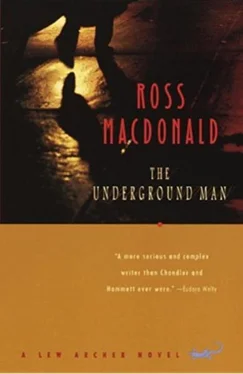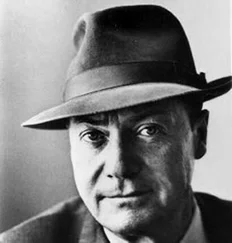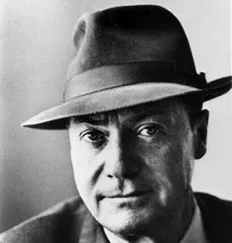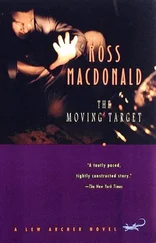“What kind of drugs?”
“I don’t really know. But he talked and acted as if he had blown his mind.” The phrase was strange on his lips, and somehow touching, like a statement of fellow-feeling with his lost son. He added nervously: “I’ve told you more than I should have.”
“You might as well tell me the rest of it.”
“There is no rest of it. That’s all there is. I had a bright promising boy and one day he decided to change all that and go and live like a waterfront bum.”
“What’s his in with Roger Armistead?”
“I sold some property to Armistead, and Armistead’s always liked him. He taught him to sail. Last year Jerry crewed for him in the Ensenada race.”
“Jerry must be a pretty good sailor.”
“He is. He could sail that sloop to Hawaii if he had to.” His mood swung down: “Unless he’s forgotten his navigation along with everything else.”
He rose and went to the blinded window, separating the slats with his fingers and peering out, like a man in a building under attack.
“Dammit,” he said. “I was supposed to take my fiancée to dinner.” He turned on me in quick anger. “I suppose you realize you’re wrecking my evening?”
The question didn’t deserve an answer, and he knew it. He drifted to the bar as if he might find a ghostly bartender to complain to. There was a telephone on the bar, with a little blue book beside it. He opened the book as if to look up a number, then dropped it again. Instead he got out a fresh glass and poured a scotch and water and rapped it down in front of me.
I thanked him for the gesture, though I didn’t need the drink. I could feel a long night coming on. So could Kilpatrick. He stood above me leaning on the table, his hands splayed out, his face expanding with emotion.
“Look,” he said. “I’m not the swinging bastard I – you think I am. When Jerry was just a tot my wife ran out on me. I never gave her any good reason to leave me, except that I couldn’t provide the life romantic. But Jerry blamed me for the breakup. He’s always blamed me for everything.” He drew in a deep mournful breath. “I really do care about him. I wanted the best for him, and knocked myself out to provide it. But things don’t work out like that any more, do they? No more happy endings.”
He leaned above me, listening to the silence as if he was hearing it for the first time. I said:
“What can we do to get him and Susan back?”
“I don’t know.”
“I thought of calling the FBI.”
“Don’t do that. It would be the end of Jerry.”
I felt his heavy hand on my shoulder. He removed it and went to the bar again, moving like a caged animal that had paced out the short distance many times. He poured himself a scotch and resumed his place at the round table.
“Give him a chance to bring the sloop back on his own. We don’t have to make a federal case out of it.”
“We’re going to have to tell the local police.”
“Let me do that,” he said. “I’ll talk to Sheriff Tremaine – he’s a friend of mine.”
“Tonight?”
“Of course tonight. I’m more concerned than you are. Jerry’s my son. What happens to him happens to me.” He sounded as if he wanted to mean it, but couldn’t quite feel the full sense of the words.
“Then tell me where I can reach Sue Crandall’s parents. I particularly want to talk to her father.”
“I’m sorry. I wouldn’t feel right about it.”
I hit him with the hardest words I could think of: “You may never feel right about anything again. The situation is going to hell in a handcar, and you won’t lift a finger to stop it. Still you expect some kind of happy ending.”
“I don’t expect one. I said that.” He wiped his eyes and cheeks with a downward motion of his palms, which stayed pressed together at his chin in a prayerful attitude. “You’ve got to give me time to think this through.”
“Sure. Take several hours. I’ll sit here and wonder what’s happening to the Broadhurst boy.”
Kilpatrick gave me a grave look across his peaked fingers. I caught a glimpse of the broken seriousness which lived in him like a spoiled priest in hiding.
The doorbell chimed, and he left the room, closing the door behind him. I picked up the small blue book beside the phone. It contained a handwritten list of numbers. A Lester Crandall was listed among the C’s, with a Pacific Palisades number. The listing probably wasn’t new – there were other names below it on the page.
As I was making a note of it, the door was flung open behind me. It was the dark-haired woman from the pool-side. She was a handsome woman, but a little old for the bikini she was wearing. And she was smashed.
“Where’s the action?” she said boisterously.
“There is none.”
The corners of her mouth drooped like a disappointed child’s. “Brian promised to take me dancing.”
She did a few experimental steps, and almost fell down. I led her to one of the chairs, but she didn’t want to sit still. She wanted to dance.
Kilpatrick came into the room. He gave no sign of noticing the woman. Moving like something mechanical and preaimed, he went behind the bar and opened a drawer and took out a heavy revolver.
“What goes on?” I asked him.
He gave no answer, but I didn’t like the look of inert cold anger on his face. I followed him out to the front of the house, letting him know I was there. A rather wild-eyed young man with soot on his forehead was waiting at the front door.
Kilpatrick showed him the gun. “Get out of here. I don’t have to put up with this kind of nonsense.”
“You call it nonsense, do you?” the young man said. “I lost my house and my furniture. My family’s clothes. Everything. And I’m holding you responsible, Mr. Kilpatrick.”
“How am I responsible?”
“I talked to a fireman after my house burned down – too bad he wasn’t there when it burned, but he wasn’t – and he said that canyon should never have been built in, with the high fire hazard. You never even mentioned that when you sold it to me.”
“It’s a risk we all run,” Kilpatrick said. “I could be burned out tonight or tomorrow myself.”
“I hope you are. I hope your house burns down.”
“Is that what you came here to tell me?”
“Not exactly.” The young man sounded a little ashamed. “But I’ve got no place to spend the night.”
“You’re not going to spend it here.”
“No. I realize that.”
He ran out of words. With a parting look at the gun in Kilpatrick’s hand, he walked quickly to a station wagon which was parked beside my taxicab. A number of children peered out through the back windows of the wagon, like prisoners wondering where they might be taken next. A woman sat in the front seat, looking straight ahead.
I said to Kilpatrick: “I’m glad you didn’t shoot him.”
“I had no intention of shooting him. But you should have heard the names he was calling me. I don’t have to take–”
I cut in: “What area did he live in?”
“Canyon Estates. I’m the developer.”
“Did the canyon go?”
“Not all of it. But several houses burned, including his.” Kilpatrick jerked his angry head toward the departing station wagon. “He isn’t the only one who took a beating. I’m still paying interest on some of those houses, and I’ll never be able to move them now.”
“Do you know what happened to Elizabeth Broadhurst’s house?”
“The last I heard it was still standing. Those old Spanish-type structures were built to resist fire.”
The dark-haired woman came up behind Kilpatrick. She had put on a light coat over her bikini and she looked quite sober, but sick.
“For heaven’s sake,” she said to him, “put that gun away. It scares the living hell out of me when you wave that gun around.”
Читать дальше












